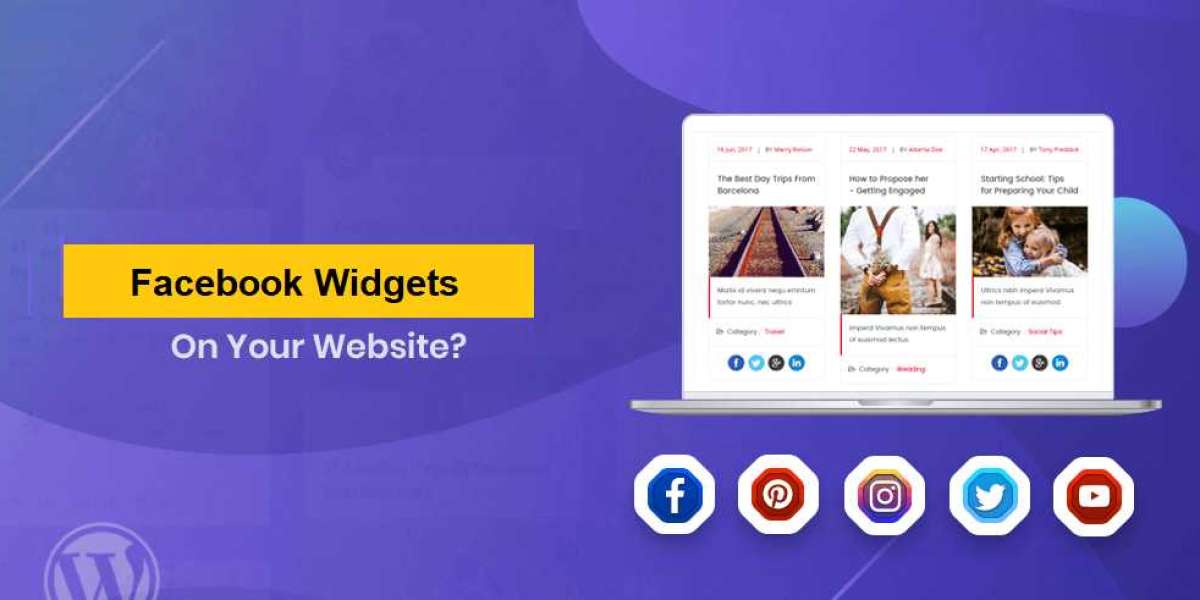Facebook is the best social media popular chatting website and Facebook widget are simple to install and customize. They offer several benefits, including increased brand awareness, improved social media engagement, and higher website traffic. In the following sections, we will explore the different types of Facebook widgets and how they can be used to enhance your online presence.
Types of Facebook Widgets
Facebook offers several types of widgets that can be added to your website, each with its own unique function. The most common types of Facebook widgets are:
Like Button: The like button is perhaps the most recognizable Facebook widget. It allows website visitors to "like" your Facebook page without leaving your website. This widget can help increase your page's visibility and followers, as well as improve your website's search engine optimization (SEO) by indicating social proof.
Share Button: The share button is another popular Facebook widget that allows website visitors to share your website's content on their Facebook page. This widget can help increase your website's visibility and reach, as well as improve your website's SEO by indicating social proof.
Page Plugin: The page plugin is a more advanced Facebook widget that allows website owners to embed their Facebook page directly onto their website. This widget can display your page's timeline, events, and messages, as well as allow visitors to like and share your page without leaving your website.
Comments Plugin: The comments plugin is a Facebook widget that allows website visitors to leave comments on your website using their Facebook account. This widget can help increase website engagement and user-generated content, as well as improve your website's SEO by indicating social proof.
Benefits of using Facebook Widgets
Using Facebook widgets on your website can offer several benefits, including:
1 . Increased brand awareness: By integrating your Facebook page with your website, you can increase your brand's visibility and awareness. This can help attract new followers and customers, as well as improve your online reputation.
2. Improved social media engagement: Facebook widgets can help increase engagement on both your website and Facebook page by allowing visitors to like, share, and comment on your content without leaving your website.
3. Higher website traffic: By driving more engagement and followers to your Facebook page, you can also drive more traffic to your website. This can help increase your website's visibility and improve your search engine rankings.
4. Enhanced user experience: Facebook widgets can help improve the user experience on your website by providing visitors with more opportunities to interact with your brand and content.
How to install Facebook Widget on your website
Installing Facebook widgets on your website is a straightforward process.
First, you will need to log in to your Facebook account and navigate to the developer tools section.
From there, you can select the type of widget you want to add to your website and customize its settings.
Once you have customized your widget, you can generate the code needed to embed it on your website.
Finally, you can add the code to your website's HTML or CMS, depending on your website's platform.
It's important to note that some website builders, such as WordPress, offer plugins that make it even easier to install and customize Facebook widgets.
Customization options for Facebook Widget
Facebook widgets offer several customization options that allow you to tailor the widget's appearance and functionality to your brand's needs.
For example, you can customize the color, size, and layout of the widget to match your website's design. You can also choose which elements of your Facebook page to display, such as your timeline, events, or messages.
Additionally, you can customize the widget's behavior, such as whether to show a pop-up dialog or redirect visitors to your Facebook page once they interact with the widget.
Best practices for using Facebook Widget
To get the most out of your Facebook widgets, it's important to follow some best practices.
Choose the right type of widget: Depending on your goals, some types of Facebook widgets may be more effective than others. For example, if you want to increase your page's visibility and followers, the like button may be the best option. If you want to drive more traffic to your website, the share button may be more effective.
Place widgets strategically: To maximize engagement, it's important to place your widgets in the right location on your website. For example, placing the like button at the top or bottom of a blog post can help increase engagement and followers.
Customize widgets to match your brand: By customizing the appearance and functionality of your widgets, you can make them more appealing to your target audience and improve engagement.
Monitor performance: It's important to track the performance of your widgets regularly to ensure they are meeting your goals. You can use Facebook Insights or other analytics tools to track engagement, follower growth, and website traffic.
Facebook Widget alternatives
While Facebook widgets are a powerful tool for digital marketers, they are not the only option available. Other social media platforms, such as Twitter and Instagram, also offer widgets that can be integrated into your website. Additionally, there are several third-party social media management tools that offer advanced widget customization and tracking features.
Troubleshooting common issues with Facebook Widget
While Facebook widgets are generally easy to install and use, they can sometimes encounter issues.
Some common issues include:
Widget not loading: This can be caused by an incorrect widget code or a problem with your website's code. Double-check your code and ensure it is properly embedded in your website.
Widget not displaying properly: This can be caused by a conflict with your website's CSS or JavaScript code. Try disabling other plugins or scripts to see if this resolves the issue.
Slow loading times: This can be caused by a large amount of content being loaded by the widget. Try reducing the amount of content displayed by the widget or optimizing your website's loading speed.
Conclusion
In conclusion, Facebook widgets are a powerful tool for digital marketers looking to enhance their online presence. By seamlessly integrating your Facebook page with your website, you can increase engagement, followers, and website traffic. However, it's important to choose the right type of widget, customize it to match your brand, and monitor its performance regularly to ensure it is meeting your goals.



